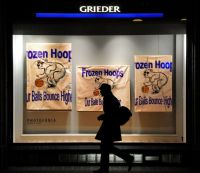GEORGE ANDREWS
by Curtis J. Phillips
George Lloyd Andrews (born September 18, 1917 Victoria
B.C.) was one of the first Canadian basketball players to feature his talents south of the border when he joined the University
of Oregon Ducks for the 1939-40 school year.
He had some big shoes to fill as the Ducks were defending
NCAA champions, make that the only NCAA Basketball Champions ever known at that time, in as much as they had defeated
Ohio State 46-33 at Northwestern University gymnasium March 27, 1939 for the original title.
The Ducks had had a 29-5 season in 1938-39.
The Tall Firs were cut down to size for the 1939-40 season
winning 19 games while losing 12.
Andrews played in 27 games, dropping in 72 points for
a 2.6 points per game (ppg) average.
The team, and Andrews, played even for the 1940-41 campaign
with a 18-18 record. The Victoria, British Columbia native averaged 6.4 ppg while playing all 36 games. His total was 233
points.
Two things changed for Andrews prior to the 1941-42 season.
He changed his jersey number from 14 to 4 and he was named Ducks' team captain.
Unfortunately the Ducks had their first losing season
in nearly 10 years with a 12-15 record (previous was in 1932-33 with 8-19)
On a positive note though, Andrews averaged a career
high 6.8 ppg with 184 points in 27 games.
He finished his collegiate career with a 5.4 ppg average
while scoring 489 points in 90 games.
Despite statements in previous historical literature,
the University of Oregon media relations department confirmed on October 2, 2006, that according to their records and archives,
that George “Porky” Andrews did not earn any All-America or All-Conference honors.
Ducks players who did reach all-star status during Andrews's
playing days were John Dick (1939-40) and Vic Townsend (1940-41)
Andrews was coached all three years by the legendary
Howard Hobson (1935-47 with a 212-124 record or .631 winning percentage).
Andrews then suited up for the Vancouver Hornets
in the Pacific Coast Professional Basketball League (PCPBL 1946-48).
Team members for the inaugural
year were Norm Baker, Arthur Chapman, Reg Clarkson, Ken lawn, Ritchie Nicol, Doug Peden and Sykes...first name unknown.
The team was a high-scoring
one as they set a PCPBL record for most points in a game during the 1947-48 season, dropping 97 against Astoria Royal Chinooks
on December 27, 1947.
The Hornets finished near
the top both seasons with records of 24-14 in the regular season and 6-6 in the playoffs (1946-47) along with 29-23 for the
regular season in (1947-48).
His Hornets teammates
for the 1947-48 campaign were Baker, Chapman, Lawn, Nicol, Bill (Stretch) Osterhaus, Peden, Dave Teyema, Jack Vaughn
and Dean White
In 1946-47 Andrews was
one of two Canadians, along with Hornets ' teammate Baker, to play in the World Professional Basketball Tournament (WPBT)
with the Portland Indians.
The Indians lost their
only game played 62-48 to the Sheboygan Redskins.
Indianapolis Kautskys
would win the championship led by Arnie Risen (future four-time NBA all star).
The WBBT was sponsored
by the Chicago Herald-American newspaper and featured professional teams from the various professional leagues at the time.
Baker was without a doubt
the greatest player Andrews had ever teamed with.
Named Canada's Basketball
Player of the Half Century (1900-50), Baker had played professionally for the Chicago Stags of the Basketball Association
of America and was the top scorer in the PCPCL history.
In 1946-47 he was
second to to Gale Bishop of the Bellingham Fircrests
scored 771 (19.9 ppg) to Baker's 694 (18.8) points while in 1947-48 Baker averaged 22.6 ppg.
Baker would also play
a few years with the Boston Whirlwinds and New York Celtics the opponents (foils) of the Harlem Globetrotters.
Andrews would also win
several Canadian national titles highlighted by the 1935 Victoria Blue Ribbons, which had showcased his talents to the
Ducks. Another impressive national championship came with the 1946 Victoria Dominoes.
Andrews also found the
winning formula for coaching while leading the Victoria High School Totems to provincial titles in 1959, 1962 and 1969.

